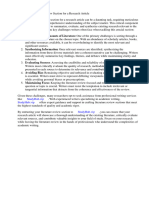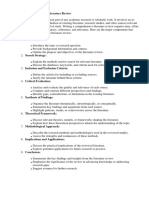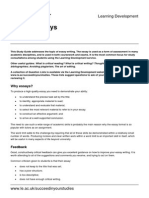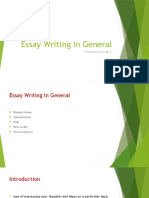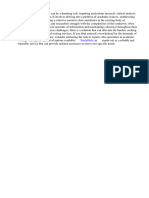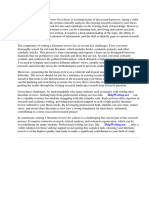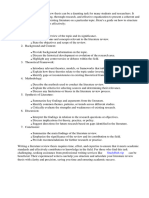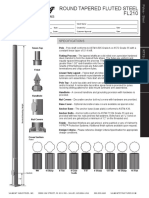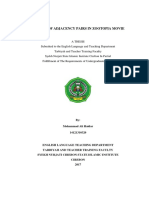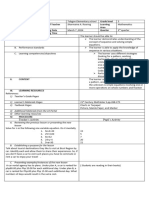Critical Writing
Critical Writing
Uploaded by
krishCopyright:
Available Formats
Critical Writing
Critical Writing
Uploaded by
krishOriginal Title
Copyright
Available Formats
Share this document
Did you find this document useful?
Is this content inappropriate?
Copyright:
Available Formats
Critical Writing
Critical Writing
Uploaded by
krishCopyright:
Available Formats
Critical Writing
Critical writing is the only way to evidence that you have thought about the meanings
and implications of what you read. Although reading academic sources can be
challenging, you are unlikely to get a high grade without critically writing. This skill
includes identifying and linking concepts, then drawing conclusions.
Therefore, critical writing should be clear, and relevant to a specific topic. Your
writing should be logically presented, and consider the depth, breadth, significance
and fairness of the evidence selected. There should be clear links and signposting
between themes.
Critical writing is a large topic, and it is likely you will find other critical writing
approaches. This guide provides one approach to critical writing, so it may not match
previous advice you have received. If this happens, we suggest you use an
approach that works for you.
Critical writing in five steps (adapted from Hilsdon’s (2010) three-step and The
Open University’s (2013, cited in Williams, 2014), seven-step processes)
1. Understanding key points
2. Analysing relationships between points/themes
3. Using evidence and developing arguments
4. Applying the argument to your assignment/question
5. Considering implications, recommendations and drawing conclusions
Your assignments may not require every element of every step – for example, some
essays do not require recommendations. The next part of this guide defines each
step in the process, explains how to demonstrate each step in your writing and
provides annotated examples of what each step looks like in a final written piece.
Critical Writing 1|Page
Breakdown of each step
1. Understanding key points
What does this Understanding begins with effective academic reading and
step mean? note-taking, which are used to divide what you have read into
themes. To write critically, you must have a clear
understanding of the sources you read.
How do I do You show your understanding of key points by selecting
this? which topics to discuss, and how you arrange and divide
topics into themes when you answer your assignment
question(s).
Associated Academic reading
study skills Evaluating written sources
Note taking (any/all versions)
A guide to critical reading
2. Analysing relationships between points/themes
What does this Consider how your themes link together. For example, one
step mean? theme may support another, or detract from it. You will also
need to consider the impact of these relationships; for
example, agreeing sources may become more believable.
How do I do Your analysis can be seen in the structure (order) of your
this? writing. You should clearly identify which themes are related
and discuss the type of relationships these are. Tell your
reader how trustworthy each source is and highlight any
problematic or supportive links between each of your sources.
Associated Critical reading
study skills Planning an assignment
Argument construction
Writing to attract a higher grade checklist
Critical Writing 2|Page
3. Using evidence and developing arguments
What does this Using evidence is crucial to academic writing and for critical
step mean? writing you should use a range of sources that are both for
and against the point you are discussing.
How do I do Creating summaries of sources and synthesising (combining
this? multiple sources) in your work are the best ways to use your
sources. Your arguments should be based on your findings
while looking for themes.
Associated Argument construction
study skills Linking - references and developing own voice
Critical analysis – integrating theory and practice
Literature reviews
Summarising text
4. Applying the argument to your assignment/question
What does this This step is about focussing your writing to address the
step mean? question you have been given/chosen.
How do I do You can show the type of relationship between the argument
this? you are making in a paragraph and the question you are
addressing in the topic sentence, and you can relate the
significance of what a source says to your question in the
explanation/link sections of that paragraph.
Associated Breaking down an assignment question
study skills Introducing what an author said
Paragraph structure
Critical writing
Showing analysis and evaluation in your writing
Critical Writing 3|Page
5. Considering implications, recommendations and drawing conclusions
What does this Depending on your question, you may need to assess the
step mean? accuracy of a statement, suggest an effective method or
identify areas for improvement in a concept. Re-reading the
question helps focus on the point of your writing (You should
do this throughout the writing process).
How do I do The minor differences between regular and critical
this? conclusions should be addressed by critical discussions
forming your summary and suggestions/point of view.
Associated Conclusion writing
study skills Critical writing
Writing to attract a higher grade
Critical writing evidenced
The following page offers a possible response to a sample question that requires a
critical response and illustrates the steps as outlined in this guide. The citations used
in this example are not real sources and are used to demonstrate where and how
citations are used in critical writing. They have been constructed using the Harvard
referencing conventions, details of which can be found on
https://www.citethemrightonline.com/. Please contact studyhub@beds.ac.uk if you
would like to discuss this further.
Critical Writing 4|Page
Sample question:
“Discuss the scope and effects that notetaking has in a higher education setting”.
1. Understanding key points
Notetaking is not without its detractors with the most common claim being that
notetaking requires more time than it saves (Harrod, 2017).
2. Analysing relationships between points/themes
If the process of assignment writing is viewed as what can be called ‘time-based’
rather than ‘quality-based’ task as Smith (2019) suggests…
3. Using evidence and developing arguments
… then this argument is fair; however, as Sanderson (2019, p.29) asserts, “time
should never be the limiting factor to the quality of your writing”.
4. Applying the argument to your assignment/question
The suggestion that time is more important than quality also ignores that
understanding can develop while taking notes (Mikhael and Hill, 2016) rather than as
a separate task, and that the speed of notetaking can drastically increase with
experience (Rowan et al., 2018). These arguments are countered by a broad
agreement that time spent taking notes while reading could be presupposed when
setting deadlines for assignments, and should be regarded as part of the expected
practice of research in a higher education setting (Jones, 2016).
5. Considering implications, recommendations and drawing conclusions
Although notetaking has some minor drawbacks, these are vastly outweighed by the
benefits it provides which are significant in relation to student achievement and
comprehension. It is also for these reasons that notetaking should be expected from
students in higher education, and should be communicated to learners early in their
university careers, along with an outlining of the benefits notetaking can provide.
Further information
Study Hub@Library provides a range of opportunities for you to enhance your
academic skills. For more information, visit https://lrweb.beds.ac.uk/studyhub
Critical Writing 5|Page
You might also like
- Everest Results SlideDocument21 pagesEverest Results SlideOsama Khan50% (2)
- Book Review - Fundamental 5Document5 pagesBook Review - Fundamental 5api-387925041No ratings yet
- Start With Why PDFDocument13 pagesStart With Why PDFSunnNight100% (1)
- Presentation - Academic Writing Skills 2023Document30 pagesPresentation - Academic Writing Skills 2023alona.mironchukNo ratings yet
- Academic WritingDocument20 pagesAcademic WritingDherick Raleigh100% (1)
- Literature Review Section of A Research ArticleDocument7 pagesLiterature Review Section of A Research Articleafmabzmoniomdc100% (1)
- How To Write A Synthesis Essay QuestionDocument8 pagesHow To Write A Synthesis Essay Questionsusanmigliacciostamford100% (2)
- Purpose of A Critical ReviewDocument4 pagesPurpose of A Critical ReviewMelikteNo ratings yet
- DeVry ENGL 147 All Discussion Questions - GradedDocument6 pagesDeVry ENGL 147 All Discussion Questions - GradedshonwilllenNo ratings yet
- Basic Literature ReviewDocument6 pagesBasic Literature Reviewc5qwqy8v100% (1)
- Academic WritingDocument11 pagesAcademic Writing22-55696No ratings yet
- Q3 ENG10 Wk-4 FinalDocument8 pagesQ3 ENG10 Wk-4 FinalMaricel VenturaNo ratings yet
- How To Write A CritiqueDocument4 pagesHow To Write A CritiqueHiba NadhimNo ratings yet
- Major Components of Literature ReviewDocument7 pagesMajor Components of Literature Reviewea1yw8dx100% (1)
- Critical Writing v1 0Document4 pagesCritical Writing v1 0Sarah WalkerNo ratings yet
- Example of A Thesis Statement For A Critical Analysis PaperDocument4 pagesExample of A Thesis Statement For A Critical Analysis Papererinrossportland100% (1)
- Categories of Academic WritingDocument10 pagesCategories of Academic WritingmemymzitoNo ratings yet
- Peer Review Strategies and Checklist PDFDocument4 pagesPeer Review Strategies and Checklist PDF5rrh4sf5jxNo ratings yet
- Som Essay Writing Guide 1Document34 pagesSom Essay Writing Guide 1Nithyanandan MavilapatharaNo ratings yet
- Basic Steps To Writing A Literature ReviewDocument8 pagesBasic Steps To Writing A Literature Reviewc5r0qjcf100% (1)
- Literature Review in Dissertation ExamplesDocument6 pagesLiterature Review in Dissertation Examplesea7y3197100% (1)
- Critical CourseworkDocument8 pagesCritical Courseworkzgctgvvcf100% (2)
- Writing EssaysDocument8 pagesWriting Essaysmwananzambi1850No ratings yet
- How To Write A Literature Review ConclusionDocument4 pagesHow To Write A Literature Review Conclusionafmzvaeeowzqyv100% (1)
- How Many Pages Should A Literature Review Be For A DissertationDocument7 pagesHow Many Pages Should A Literature Review Be For A DissertationHelpMeWriteAPaperMurfreesboroNo ratings yet
- Academic WritingDocument14 pagesAcademic WritingJulianne Descalsota LegaspiNo ratings yet
- Literature Review Tips DissertationDocument8 pagesLiterature Review Tips Dissertationafdtsdece100% (1)
- Writing Assignments MethodsDocument4 pagesWriting Assignments MethodsXaronAngelNo ratings yet
- Dissertation What Is A Literature ReviewDocument5 pagesDissertation What Is A Literature Reviewdajev1budaz2100% (1)
- How To Write A Discussion Section in A Literature ReviewDocument6 pagesHow To Write A Discussion Section in A Literature Reviewc5p9zbepNo ratings yet
- Writing A Thesis For A Synthesis EssayDocument4 pagesWriting A Thesis For A Synthesis EssayBuyThesisPaperSingapore100% (1)
- Academic Reading and WritingDocument48 pagesAcademic Reading and WritingTheus LineusNo ratings yet
- How Do You Write A Thesis Statement For A Synthesis EssayDocument5 pagesHow Do You Write A Thesis Statement For A Synthesis Essayjuliasolembellevue100% (1)
- Week 8 - CRITICAL WRITING IN THE ACADEME PDFDocument5 pagesWeek 8 - CRITICAL WRITING IN THE ACADEME PDFDAVE BARIBENo ratings yet
- How To Write A Literature Review in 2 DaysDocument4 pagesHow To Write A Literature Review in 2 Daysc5eyjfnt100% (1)
- Dissertation Thematic ApproachDocument7 pagesDissertation Thematic ApproachHelpWithWritingPapersPittsburgh100% (1)
- CWS Presentation Group 1Document25 pagesCWS Presentation Group 1Muhammad IrfanNo ratings yet
- Literature Review Argument ExampleDocument8 pagesLiterature Review Argument Exampleafmzhuwwumwjgf100% (1)
- Critical Reading LectureDocument40 pagesCritical Reading LectureAiza San Pedro SantosNo ratings yet
- COMMUNICATION-FOR-VARIOUS-PURPOSESDocument6 pagesCOMMUNICATION-FOR-VARIOUS-PURPOSESmarianne lualhatiNo ratings yet
- HonestyDocument4 pagesHonestyAamer RiazNo ratings yet
- Staff - Shares - Storage 500mb - Library - ID112668 - Rwanda - HowToWriteAPhDProposalDocument4 pagesStaff - Shares - Storage 500mb - Library - ID112668 - Rwanda - HowToWriteAPhDProposalnoraNo ratings yet
- Literature Review First ParagraphDocument7 pagesLiterature Review First Paragraphaflsqyljm100% (1)
- Academic Writing Undergraduate Support Guide-A7316d44Document42 pagesAcademic Writing Undergraduate Support Guide-A7316d44Khomotso PenelopeNo ratings yet
- Example Introduction Literature Review DissertationDocument7 pagesExample Introduction Literature Review Dissertationc5p5qwnwNo ratings yet
- How To Write A Thesis Statement For Comparative AnalysisDocument4 pagesHow To Write A Thesis Statement For Comparative AnalysisAshley Carter100% (2)
- Writing Good Essays and AssignmentsDocument7 pagesWriting Good Essays and AssignmentsImran AhmedNo ratings yet
- How Many Words Should A Literature Review Be in A DissertationDocument8 pagesHow Many Words Should A Literature Review Be in A DissertationafmzqaugqrckggNo ratings yet
- Writing EssaysDocument8 pagesWriting EssaysRiyaz AhmedNo ratings yet
- Literature Review On Teaching MethodsDocument7 pagesLiterature Review On Teaching Methodsafdtyfnid100% (1)
- How To Write Good Literature Review For ThesisDocument7 pagesHow To Write Good Literature Review For Thesisgj9ggjry100% (2)
- Lec 4,5,6Document28 pagesLec 4,5,6nyabokegrace007No ratings yet
- How To Structure A Literature Review ThesisDocument6 pagesHow To Structure A Literature Review Thesiscmppcmwgf100% (1)
- Writing A Dissertation Literature ReviewDocument7 pagesWriting A Dissertation Literature ReviewBestWriteMyPaperWebsiteCanada100% (1)
- Review of Literature in Thesis FormatDocument6 pagesReview of Literature in Thesis Formataflsvagfb100% (1)
- Eap 2 U1 PDFDocument14 pagesEap 2 U1 PDFPial Hassan ChowdhuryNo ratings yet
- Read CompDocument157 pagesRead CompYasmin AbdelmajiedNo ratings yet
- How To Write A Literature Review For Educational ResearchDocument5 pagesHow To Write A Literature Review For Educational Researchc5rek9r4No ratings yet
- Should A Dissertation Be Written in First or Third PersonDocument8 pagesShould A Dissertation Be Written in First or Third Personglasunvema1980No ratings yet
- Report Format Literature ReviewDocument8 pagesReport Format Literature Reviewafdttricd100% (1)
- How To Write A PHD Proposal: December 2017Document5 pagesHow To Write A PHD Proposal: December 2017Usman QureshiNo ratings yet
- 4 CE7Document7 pages4 CE7krishNo ratings yet
- Brand: Floating and Trunnion Mounted Ball Valves Soft and Metal Seated ASME CLASS 15O 2500Document52 pagesBrand: Floating and Trunnion Mounted Ball Valves Soft and Metal Seated ASME CLASS 15O 2500krishNo ratings yet
- Round Tapered Fluted Steel FL210: SpecificationsDocument2 pagesRound Tapered Fluted Steel FL210: SpecificationskrishNo ratings yet
- SP - C - 1634-00002-Tender Circular No.01-Pre Bid Minutes of Meeting PDFDocument3 pagesSP - C - 1634-00002-Tender Circular No.01-Pre Bid Minutes of Meeting PDFkrishNo ratings yet
- Tally ERP9 Course Syllabus GST123Document1 pageTally ERP9 Course Syllabus GST123avinash guptaNo ratings yet
- Ethics Report: InconsistencyDocument4 pagesEthics Report: InconsistencynattyNo ratings yet
- Action Plan Philo Outreach ProgramDocument4 pagesAction Plan Philo Outreach ProgramMA. CHONA PILONGO100% (1)
- Pink Professional Gradients Conference Research Education PresentationDocument22 pagesPink Professional Gradients Conference Research Education PresentationAlaizah MenianoNo ratings yet
- A Study of Adjacency Pairs in Zootopia MovieDocument29 pagesA Study of Adjacency Pairs in Zootopia MovieBaiqtrie WidyaNo ratings yet
- Math March 6Document5 pagesMath March 6Sharmaine Adolfo RoaringNo ratings yet
- Speech CommunitiesDocument2 pagesSpeech CommunitiesDekaNo ratings yet
- Student Response Lesson PlanDocument3 pagesStudent Response Lesson Planapi-391673766No ratings yet
- UNIT 3 PritchardDocument7 pagesUNIT 3 PritchardRitika ChauhanNo ratings yet
- Lesson 3 Module - 202203140505Document5 pagesLesson 3 Module - 202203140505Precious Verlie Grace BarengNo ratings yet
- English Lesson Plan Body PartsDocument7 pagesEnglish Lesson Plan Body PartsHessa MohammedNo ratings yet
- Languo: English BooksDocument3 pagesLanguo: English BooksサポーターNo ratings yet
- Brain Computer Interface (BCI)Document28 pagesBrain Computer Interface (BCI)nikhil kumarNo ratings yet
- OB Final CLA 2Document11 pagesOB Final CLA 2Deepika GautamNo ratings yet
- New Trends in Marketing Research 1Document33 pagesNew Trends in Marketing Research 1emmawattt3110No ratings yet
- Adm Melc RwsDocument3 pagesAdm Melc RwsKristine Portia Zuyco DelusoNo ratings yet
- Customer Relationship Management: Service Quality Gaps, Data Warehousing, Data MiningDocument6 pagesCustomer Relationship Management: Service Quality Gaps, Data Warehousing, Data MiningAsees Babber KhuranaNo ratings yet
- DPPDocument16 pagesDPPminalally234No ratings yet
- Introduction To Classification - PPT Slides 1Document62 pagesIntroduction To Classification - PPT Slides 1Saurabh PratapNo ratings yet
- Metacognition: Republic of The Philippines University Town, Catarman Northern Samar Web: EmailDocument6 pagesMetacognition: Republic of The Philippines University Town, Catarman Northern Samar Web: EmailyoonglespianoNo ratings yet
- CGT 17208 Project 1Document10 pagesCGT 17208 Project 1api-598892083No ratings yet
- Nikaido ScholarshipDocument2 pagesNikaido ScholarshipnguywdrtffdNo ratings yet
- Class 2 - Kahneman and Tversky - Judgment Under Uncertainty, Heuristic and BiasesDocument9 pagesClass 2 - Kahneman and Tversky - Judgment Under Uncertainty, Heuristic and BiasesSamantha Nicole GuiaoNo ratings yet
- Machine Learning For BeginnersDocument16 pagesMachine Learning For BeginnerskhaabaNo ratings yet
- Improve Your Skills Reading For IELTS 4.5-6 (PDF - Io)Document4 pagesImprove Your Skills Reading For IELTS 4.5-6 (PDF - Io)Minh NgocNo ratings yet
- Adaptive Art and Art Therapy: Reporter: Group4Document12 pagesAdaptive Art and Art Therapy: Reporter: Group4Vince Aprelle MasaltaNo ratings yet
- A Semi Detailed Lesson Plan in English 5Document3 pagesA Semi Detailed Lesson Plan in English 5Caido Marie AngelaNo ratings yet





